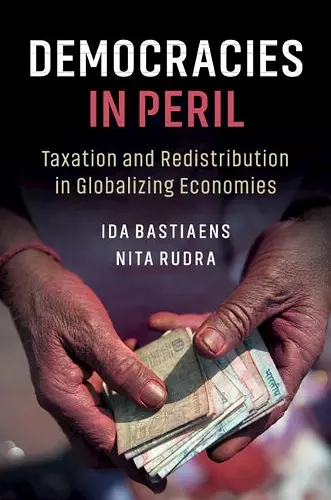Democracies in Peril
Taxation and Redistribution in Globalizing Economies
Nita Rudra author Ida Bastiaens author
Format:Paperback
Publisher:Cambridge University Press
Published:25th Jun '18
Should be back in stock very soon
This paperback is available in another edition too:
- Hardback£84.99(9781108470483)

Explains the political factors behind the failure of many developing country democracies to benefit from globalization.
Why are developing country democracies struggling to take advantage of globalization when free trade is supposed to benefit all participants? This book makes a significant contribution to political science by revealing how and why these democracies are struggling to generate much-needed public revenues in the face of trade liberalization.Globalization is triggering a 'revenue shock' in developing economies. International trade taxes - once the primary source of government revenue - have been cut drastically in response to trade liberalization. Bastiaens and Rudra make the novel argument that regime type is a major determinant of revenue-raising capacity once free trade policies have been adopted. Specifically, policymakers in democracies confront greater challenges than their authoritarian counterparts when implementing tax reforms to offset liberalization's revenue shocks. The repercussions are significant: while the poor bear the brunt of this revenue shortfall in democracies, authoritarian regimes are better-off overall. Paradoxically, then, citizens of democracies suffer precisely because their freer political culture constrains governmental ability to tax and redistribute under globalization. This important contribution on the battle between open societies and the ability of governments to help their people prosper under globalization is essential reading for students and scholars of political economy, development studies and comparative politics.
'This book identifies a major empirical puzzle and then provides a novel and compelling explanation for it. Why has tax collection dropped in the developing world recently as globalization has progressed? And why has it dropped most for developing democracies? Trade liberalization created a revenue shock for these governments: the autocratic regimes surprisingly have been best able to find ways to compensate for this, while developing democracies have not. The book issues an important call for policy makers to address this problem before support for globalization and perhaps even democracy are eroded. Helen V. Milner, B. C. Forbes Professor of Politics and International Affairs, Princeton University, New Jersey, and Director, Niehaus Center for Globalization and Governance, Woodrow Wilson School
Bastiaens and Rudra uncover an important and sobering fact: compared to liberal authoritarian regimes, developing democracies that liberalize trade cannot offset revenue losses from lower tariffs. They face a democratic dilemma: apparently, public services must be sacrificed to secure the benefits of openness. The authors help us understand why, and encourage us to probe more deeply the benefits of openness in democracies with weak state institutions. Philip Keefer, Principal Economic Advisor, Institutions for Development, Inter-American Development Bank
'Trade liberalization in developing countries created a massive shortfall of revenue by cutting trade taxes. Bastiaens and Rudra argue that authoritarian regimes rather than democracies succeeded in using coercion and tax-for-policy bargains to raise revenue. Democracies are less able to use coercion and often find themselves in low-revenue traps in which citizens will not voluntarily comply with tax policies because they do not think they will see policy benefits and governments do not have the revenue needed to provide those benefits. It is a sobering but insightful description of how politics shape state capacity to provide public goods that advance human welfare and development - a terrific and important book.' Scheve Scheve, Stanford University, California
'… exceptional, theoretically rich, and empirically dense work … a must read for scholars and students working on questions at the core of both political economy research and democratic theory.' Sarah Berens, Perspectives on Politics
ISBN: 9781108454889
Dimensions: 227mm x 153mm x 18mm
Weight: 500g
342 pages